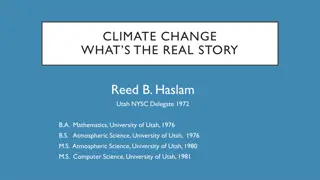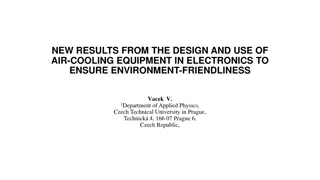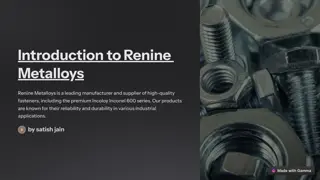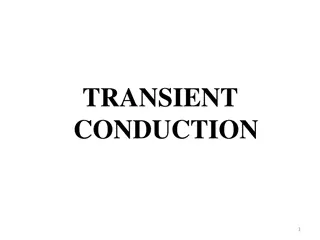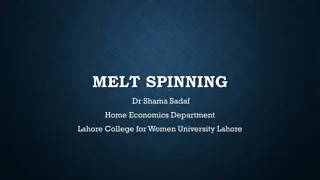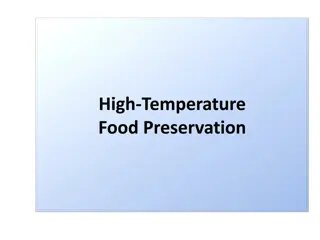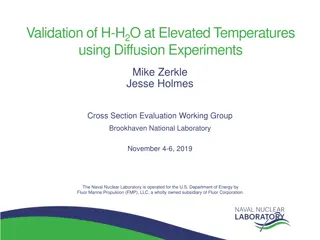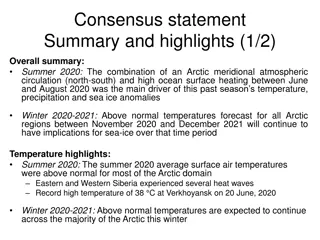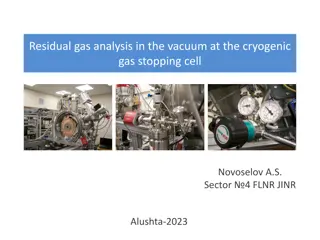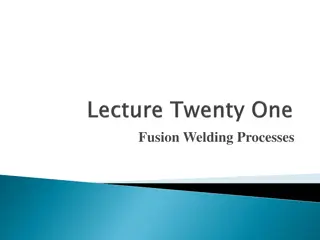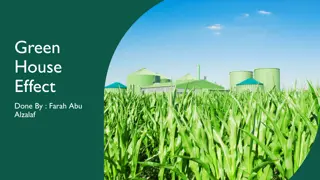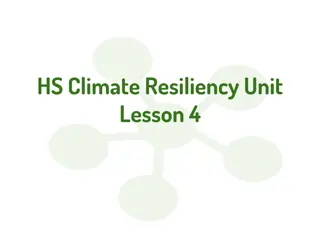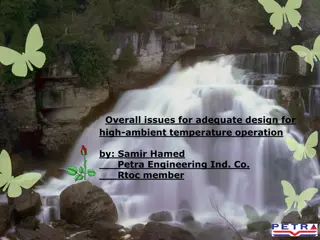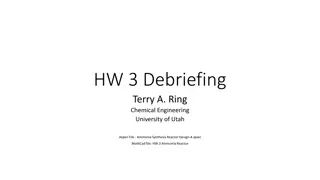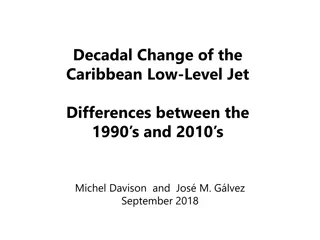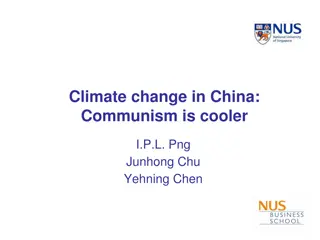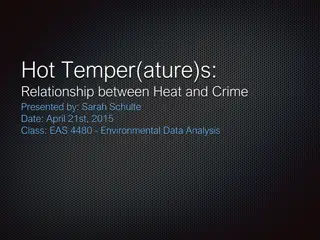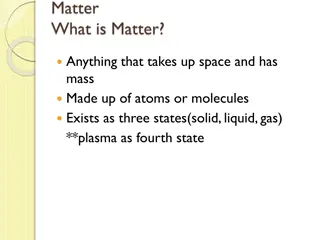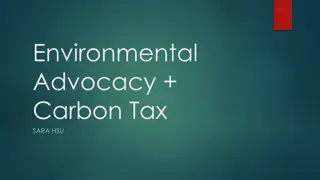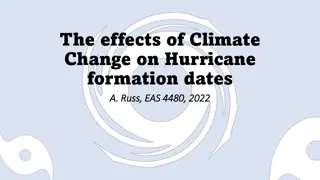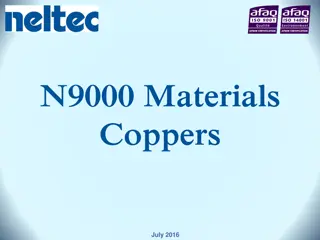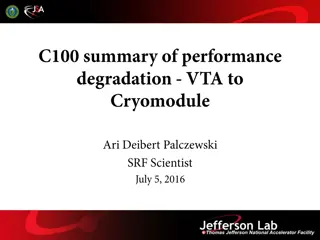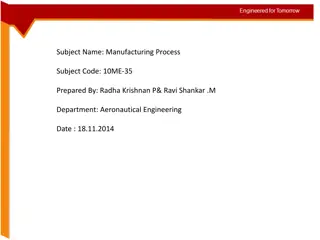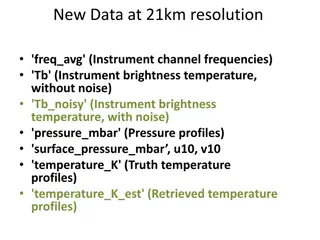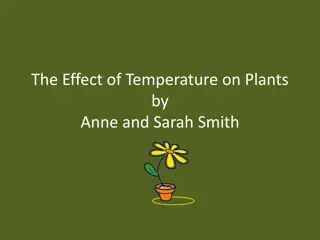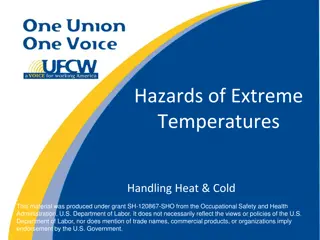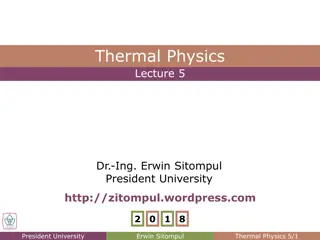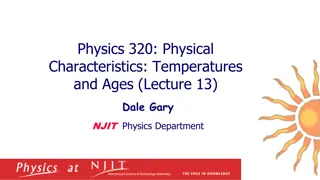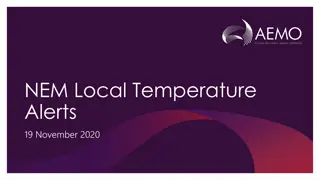Climate Change: Insights from Reed B. Haslam, NYSC Delegate 1972
Reed B. Haslam, an experienced atmospheric scientist, reflects on his early weather observations, noticing the impact of climate change through warming temperatures and reduced precipitation. He emphasizes the key contributors to global warming, such as deforestation and carbon dioxide emissions. Co
1 views • 54 slides
Innovative Air-Cooling Equipment for Electronics
The design and use of air-cooling equipment in electronics to ensure environmental-friendliness is explored in this study by Vacek V. from Czech Technical University. The equipment is designed to meet demanding requirements for high-tech electronics applications, providing precise temperature regula
0 views • 17 slides
Buy Women High Heel Sandals Online at- 9threadz
Are you on the lookout for the perfect pair of high heel sandals to complement your outfit? Look no further than 9threadz, your ultimate destination for high-quality women's footwear online. Our collection of high heel sandals is designed to add a touch of sophistication and elegance to any ensemble
0 views • 5 slides
Introduction-to-Renine-Metalloys-inconel-600
\nRenine Metalloys' Inconel 600 stands out for its exceptional resistance to high temperatures and corrosive environments, making it a top choice for demanding applications in aerospace, chemical processing, and nuclear engineering
6 views • 6 slides
Transient Conduction in Heat Transfer
Transient conduction in heat transfer occurs when boundary temperatures change, causing temperature variations within a system until a steady state is achieved. This phenomenon is commonly seen in processes like quenching hot metals. The Lumped Capacitance Method is used to analyze such scenarios, i
0 views • 55 slides
Melt Spinning in Polymer Fiber Manufacturing
Melt spinning is a specialized extrusion process used for manufacturing polymer fibers at industrial scales. It involves melting the fiber-forming substance, extruding it through a spinneret, solidifying the filament, and applying spin finish. The method allows for shaping fibers in various cross-se
1 views • 10 slides
The Effects of High Temperatures on Microorganisms in Food Preservation
High temperatures are utilized to preserve food by affecting microorganisms. Heating can lead to various outcomes such as heat shock, sublethal injury, or cell death in microbial cells and spores. The mechanisms of damage include loss of permeability, denaturation of key components, and inability to
0 views • 18 slides
Calculation and Validation of Thermal Neutron Diffusion Length in Water at Elevated Temperatures
This research focuses on the validation of thermal neutron diffusion experiments in water at elevated temperatures. Various methods, including the pulsed-neutron die-away and static relaxation length methods, were used to determine the diffusion length (L). Through linear and power fits based on dat
0 views • 7 slides
Arctic Climate Outlook: Summer 2020 & Winter 2020-2021 Highlights
In Summer 2020, Arctic experienced above-normal temperatures, wetter conditions in most areas except Siberia, and record-low sea-ice extent. Winter 2020-2021 forecasts above-normal temperatures, wetter conditions, and delayed freeze-up in certain regions.
0 views • 3 slides
Cryogenic Gas Stopping Cell for High Precision Nuclear Physics Experiments
In the field of nuclear physics, high-quality ion beam parameters are essential for both primary and secondary beams. This report focuses on the cryogenic gas stopping cell, also known as a gas catcher, designed to transform rare ion beams from nuclear reactions into low-energy beams with small emit
1 views • 12 slides
Fusion Welding Processes
Fusion welding processes such as Plasma Arc Welding (PAW) and Electron-Beam Welding (EBW) utilize high temperatures and focused energy sources to create strong bonds between metals. PAW achieves extreme temperatures of 17,000°C, enabling it to weld almost any metal with advantages like good arc sta
0 views • 12 slides
The Greenhouse Effect and Its Impact
The greenhouse effect is the trapping of the sun's warmth in a planet's lower atmosphere, primarily by greenhouse gases like carbon dioxide and water vapor. These gases absorb and re-emit infrared radiation, which leads to an increase in temperatures. While carbon dioxide and water vapor are signifi
1 views • 13 slides
Climate Resiliency and Greenhouse Gases in High School Lessons
In this high school climate resiliency unit lesson, students explore the concept of albedo and its impact on temperature changes. They investigate factors affecting temperature, calculate temperatures based on albedo, and delve into understanding greenhouse gases and their contributions to climate c
0 views • 16 slides
Design Considerations for High Ambient Temperature Operations
Designing for high ambient conditions requires special attention to condensing temperatures, refrigerant types, safety standards, and component availability. Careful selection of heat exchangers, compressors, and system applications is crucial to ensure energy efficiency and safety in various coolin
0 views • 8 slides
Ammonia Reactor System Design and Optimization Study for High Efficiency
This material discusses the design and optimization of an ammonia synthesis reactor system for maximizing conversion efficiency while minimizing CAPEX costs. Various factors such as managing heat effects, reaction runaway prevention, and cooling profiles are explored. Recommendations include using a
3 views • 10 slides
Decadal Changes in Caribbean Low-Level Jet and Atmospheric Dynamics
Analysis of decadal changes between the 1990s and 2010s in the Caribbean region focusing on the low-level jet, rainfall patterns, 925 hPa geopotential, winds, and surface temperatures during dry and rainy seasons. Significant variations observed in wind strengths, pressure gradients, and surface tem
0 views • 9 slides
PN Junction in Semiconductors
Mobility in semiconductors is affected by scattering events as temperature increases, with impurity scattering dominating at low temperatures and lattice scattering at high temperatures. A p-n junction is the interface between p-type and n-type semiconductor materials, with excess holes on the p-sid
0 views • 15 slides
Evaluating the Impact of Communism on Climate Change in China
This study analyzes the effects of political ideology on climate change in China, specifically focusing on the difference in extreme temperatures from 1954 to 2010. Results show a significant decrease in extreme temperatures in earlier years followed by an increase from 2000 onwards, particularly du
0 views • 73 slides
Porcelain and Feldspar in Ceramics
Brick clays high in alkalis and iron but low in alumina facilitate forming processes. Porcelain, made from Kaolin, quartz, and feldspar, is a vitreous ceramic fired at high temperatures. Different types of porcelain, including soft-paste and hard-paste, vary in clay and alumina content affecting fir
0 views • 4 slides
Impulse Excitation Technique for Monitoring Green Ceramics During Firing
The Impulse Excitation Technique (IET) is a nondestructive testing method employed to monitor the elastic properties of green ceramics as they undergo firing processes. This technique allows for the analysis of phase changes and material behavior at high temperatures, providing valuable insights int
0 views • 6 slides
Relationship Between Heat and Crime: A Data Analysis Study
This study investigates the relationship between elevated temperatures and violent crime rates in Fulton County, Atlanta, Georgia, from 2000 to 2013. Using data on monthly crime totals and average maximum temperatures, a least-squares linear regression analysis reveals significant correlations, part
0 views • 13 slides
States of Matter and Kinetic Theory
Matter is anything that occupies space and has mass, existing in solid, liquid, gas, and plasma states. The states of matter depend on the arrangement and motion of atoms. Solids have fixed shapes, liquids take the shape of their container, and gases fill the volume of their container. The Kinetic T
0 views • 18 slides
Urgency of Environmental Advocacy and Climate Change Action
Environmental advocacy is crucial due to the pressing issue of climate change, as evidenced by rising global temperatures, sea levels, and extreme weather events. Urgent action is needed to address warming oceans, retreating glaciers, and increasing record high temperatures. Policy solutions focus o
0 views • 17 slides
Impact of Rising Sea Surface Temperatures on Hurricane Behavior
Investigating the relationship between sea surface temperatures and hurricane behavior, focusing on the potential increase in out-of-season hurricanes with rising average SST. Data analysis from 1970-2020 reveals patterns in hurricane formation dates and categories, supporting the hypothesis of more
0 views • 13 slides
Advanced Copper Treatments for High-Frequency Applications
Introducing the N9000 series of copper materials featuring zinc-free treatments for improved thermal resistance, high bond strength, and increased treatment density. These treatments maintain structure at high temperatures, enhancing integrity and reducing PIM. The N9000 R Copper and N9000 S Copper
0 views • 11 slides
Quality Control and Testing Procedures for Superconducting Radiofrequency Cavities
The presentation highlights the rigorous processes involved in qualifying superconducting radiofrequency (SRF) cavities for high-performance applications. Each cavity undergoes a detailed qualification process, including BCP treatment, electropolishing, and high-pressure rinsing, to ensure optimal p
0 views • 18 slides
Overview of Cutting Tool Materials in Manufacturing Process
Cutting tool materials play a crucial role in the manufacturing process, encountering high temperatures, stresses, and friction. Materials like high-speed steels, cast-cobalt alloys, and carbides offer varying properties such as hardness, toughness, and wear resistance to meet the demands of cutting
0 views • 23 slides
Insights on High-Resolution Earth Data at 21km Intervals
New data at 21km resolution provides a comprehensive view of various parameters including frequency averages, brightness temperatures, water vapor profiles, rain rates, pressure profiles, and temperature estimates. The files are now on a consistent 21km grid, reflecting the intent to capture tempera
0 views • 12 slides
Exploring the Vast Universe: Stars, Galaxies, and Beyond
Delve into the immense scale of the universe as we uncover the characteristics of stars, their compositions, temperatures, and distances from Earth. Learn how spectroscopy reveals the elements within stars, discover mnemonic devices for remembering star temperatures, and explore methods such as para
0 views • 10 slides
Study on the Effects of Temperature on Plant Growth
This project, conducted by Anne and Sarah Smith, investigated the impact of temperature on plant growth using radish plants. The results supported the hypothesis that plants grow more successfully in warm temperatures compared to extreme temperatures. Prior research highlighted the importance of mil
0 views • 13 slides
The Hazards of Extreme Temperatures in the Workplace
Extreme temperatures, whether hot or cold, pose significant risks to worker health and safety. This material, developed by OSHA, highlights the dangers of heat and cold exposure, including heat stroke, hypothermia, and other related illnesses. The case study mentioned underscores the importance of p
0 views • 50 slides
Molecular Speed Distribution in Thermal Physics
Exploring the distribution of molecular speeds in gases at different temperatures through the Maxwell-Boltzmann speed distribution law. This lecture covers the concepts of probability distribution functions for speed intervals, comparison of speed distributions at varying temperatures, and calculati
0 views • 22 slides
High-Risk Meeting: Identification and Care Coordination for Vulnerable Children and Families
The high-risk sub-committee is tasked with identifying children and families at high risk and developing a care coordination plan for their benefit. The meeting agenda includes reviewing the high-risk framework, discussing results and impacts, reflecting on successes and challenges, setting meeting
0 views • 12 slides
Impact of Climate Change on the Port of Cape Town
The Port of Cape Town, a critical infrastructure asset, faces challenges due to climate change. Rising temperatures have led to droughts, affecting cargo handling and operations. Additionally, rising sea levels threaten port infrastructure and equipment. Increased temperatures pose risks to employee
0 views • 18 slides
High School Dual Credit Reduced Tuition Program Information
The High School Dual Credit Reduced Tuition Program allows eligible high school juniors and seniors in South Dakota to take General Education courses at a reduced tuition rate of $48.33 per credit. Students can fulfill high school requirements while earning college credit, jumpstart their post-secon
1 views • 31 slides
Surface Temperatures and Albedo in Planetary Systems
Surface temperatures and albedo play significant roles in understanding planetary characteristics. Albedo, the fraction of sunlight reflected from a planet's surface, varies among planets. By considering factors like albedo, distance from the Sun, and energy flux, we can estimate surface temperature
0 views • 10 slides
Is Your HVAC System Failing_ 5 Signs You Need Immediate Repair in San Diego
If your HVAC system is struggling, it could lead to high energy bills and uncomfortable indoor temperatures. Watch out for these five warning signs: weak airflow, unusual noises, inconsistent temperatures, frequent cycling, and rising energy costs. I
0 views • 4 slides
Self guided tour of Heating Curves and Cooling Curves
Delve into the comprehensive study of heating and cooling curves. Understand the transformation of substances as heat energy is applied, observing phase changes from solid to gas. Follow step-by-step instructions to create graphs depicting temperature variations over time, focusing on water at diffe
0 views • 49 slides
Weather and Gas Behavior: Absolute Zero and Kelvin Scale
Concept of absolute zero and the behavior of gases at extreme temperatures. Learn about the relationship between the Celsius and Kelvin scales, and delve into the kinetic theory of gases. Discover how temperature affects the motion of gas particles and the limits of cold temperatures.
0 views • 12 slides
NEM Local Temperature
AEMO issues market notices when forecast temperatures exceed regional reference temperatures in NEM regions like Brisbane, Sydney, Melbourne, Adelaide, George Town, and more. The process includes selecting weather stations, determining alert levels, and issuing market notices based on forecast tempe
0 views • 11 slides
